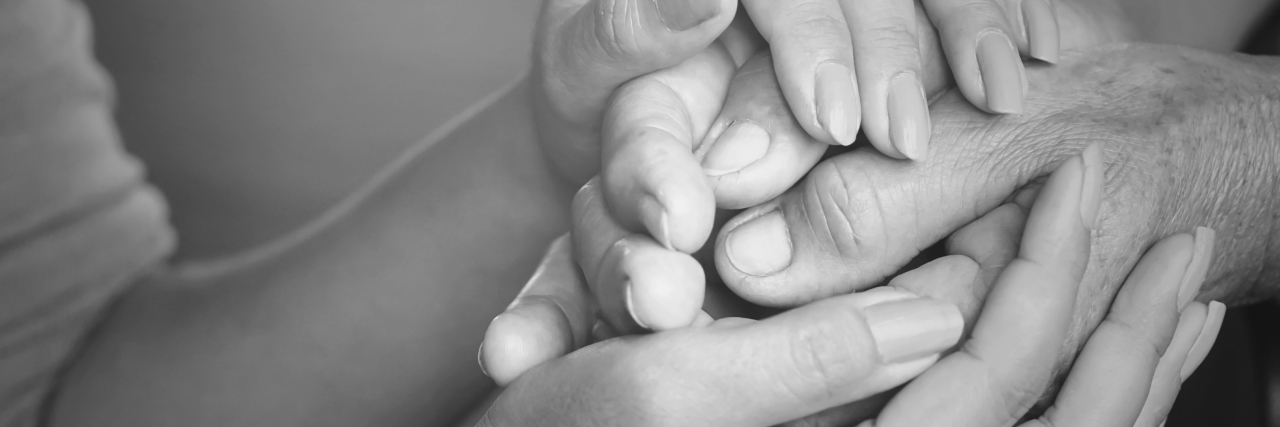Dear Dad,
You’ve always been one of my greatest teachers and supporters. You worked tirelessly with me on my awkward elementary school jump shot, transforming me into a fifth grade scoring machine. The first time I merged onto the highway, you remained my calm and steady navigator while mom (and her white knuckles) hid under a blanket in the backseat. You were my first call for guidance on negotiating a job offer, and the last one to leave the hospital room so I could rest when each of my babies arrived.
Let’s not forget some of the deeply valuable life lessons sprinkled between the milestones — you were right, certain candy bars do taste infinitely better straight out of the freezer.
So when you called to say you have cancer, it jolted my universe.
Either our immediate family has terrible or terrific luck — I’m not entirely sure which — because we’ve faced a lot of malignancy, but we’re all still standing. I brought Mom cranberry juice in bed (after high school basketball practice) on the evenings that radiation to destroy her breast cancer also demolished her energy.
I cooked my husband completely salt-free (and taste-free) food so that his radioactive iodine treatment would do its best work to eat up any remaining thyroid cancer cells. No, doubt you remember the terrible wig I wore (only once — it felt more like a mask) after chemo took my hair but saved my life.
I’ve learned a thing or two about finding my way through a complex diagnosis, which is all the more bewildering in this glorious yet treacherous Information Age. So as you confront a truly cruel and formidable opponent, please allow me to take a turn as the one offering advice.
The internet is not your friend.
Remember our chats during my first few years as a young professional? Not the ones about college basketball highlights, but the ones during which you were frantically seeking help searching for a file you had saved but couldn’t find. I’ve happily (and hopefully patiently) served as your own personal IT director.
I have to rescind one of my main teachings though: not everything you need to know can be discovered on the worldwide web. The internet is full of confusing, misleading, and inaccurate information. Especially when it comes to medicine — a curious mix of art and science — step away from the search engine. At the very least, stick to reliable sources. Googling can lead to unnecessary, unwelcome additional anxiety. Anonymous trolls on message boards haven’t seen your scans or reports and certainly don’t know your medical history.
You’ve always taught me that in-person conversations are critical — and you were right.
Doctors are like golf clubs — read the situation and choose the right one.
In the few weeks since your diagnosis you’ve had face-to-face conversations with three doctors. Each has given you slightly different information, leaving you befuddled and disheartened. Doctor shopping may feel like a full-time job (luckily you recently retired), but your health is, literally, in someone else’s hands. Whether that person uses fancy robotic equipment or old-school surgical techniques, his job is to do his darnedest to cure you.
Your equally important job as the patient is to learn as much as you can about all of your options and to make informed decisions. Worrying about offending a doctor for asking questions or electing to seek other advice? Not in your job description. If a doctor discourages your inquiries, it may be time to move on. I’d support you seeing 20 doctors, if your mental health — and insurance — allow.
Don’t fall for the doctor with the best bedside manner or most impressive degrees. To put this in a language you speak fluently, don’t be hasty and reach for a pitching wedge when you really need a putter.
Enroll in Cancer 101.
Once you’ve abandoned the internet and selected your medical team, switch to student mode. Listen, ask questions, and take notes. If we’re ready to re-friend technology (are we?), find an app to keep your thoughts organized. Doctors make mistakes –and I learned that the hard way. Mine didn’t follow the protocol for my disease, and I didn’t push the issue. My doctor deemed me cured prematurely and decided to forgo the indicated additional two rounds of chemo. That decision resulted in my illness resurfacing and several months of more intense treatment.
My husband caught hospital nurses attempting to give me the wrong medication at the wrong time. Twice. Oncologists, surgeons, pathologists — they may be lifesavers, but they’re all fallible. Trust them, but trust yourself more.
Do your homework, be prepared, and don’t be afraid to speak up. It’s their job, but it’s your life.
Dad, please, when you’re done being a student, use those teaching skills I know and love with your community. Why do we still tend to whisper the C word when thousands of people receive a cancer diagnosis daily? Share your experiences and wisdom with others — there’s no need to talk about cancer in a hushed voice.
Remember two things as your surgery date approaches:
1. I love you.
2. When you wake up from anesthesia, I’ll be waiting with frozen Snickers bars.
This post was originally published on HuffPost.
Getty Images photo via Doucefleur

